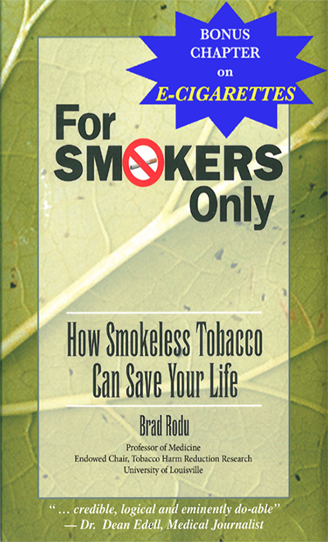As previously noted (here), e-cigarettes are winning over American smokers. E-cigs’ vapor of nicotine, water and
propylene glycol is vastly safer than smoke, and these products satisfy
smokers’ behavioral cues.
Marketers have enjoyed a regulatory moratorium since
federal judge Richard Leon blocked the FDA’s attempt to regulate e-cigs as
drug-delivery devices in 2008 and 2009 (here). His ruling was upheld on appeal (here). As a result, on April 25, 2011, the
FDA announced that e-cigs are tobacco products (here).
After some delay, the FDA recently indicated that it
may issue its first set of so-called “deeming regulations” on alternative
tobacco products this summer. There is considerable speculation as to what form
those regulations might take.
Given that the agency has shown no interest in
tobacco harm reduction, its regulatory scheme for e-cigs might mirror that for
cigarettes and traditional smokeless tobacco products. That could include onerous advertising and
marketing restrictions that would cripple efforts to increase awareness and
trial of e-cigs by smokers.
Because e-cigs are tobacco products, they will be
saddled with heavy federal and especially state excise taxes. Cigarette consumption is gradually declining,
which means that state payments from the 1998 Master Settlement Agreement are
in decline. To counter that, some states
have raised cigarette taxes dramatically, which ironically threatens legal
sales and tax revenue and encourages black marketeers.
Tobacco prohibitionists, including medical
associations, federal agencies and state health departments, don’t want smokers
to switch to e-cigs; they will pressure legislators for high e-cig taxes that
erase any economic advantage. On the
other hand, weak opposition to all taxes can be expected from loosely organized
e-cig consumers, trade groups and individual marketers. In that scenario, tobacco control and high
taxes are likely to prevail.
Two states, Oklahoma and South Carolina, have
considered a rational approach to e-cig excise taxes: a nickel per unit of nicotine solution, with
the tax never to exceed one-tenth of the excise tax on a pack of
cigarettes. It’s not perfect – a 1:50 or 1:100 ratio would be more appropriate – but it’s a positive development for
tobacco harm reduction, one I proposed ten years ago (here) and again in 2008 (here).
As I wrote in 2003: “When it comes to taxes there
are no easy answers. But a rational
tobacco tax strategy based on risk is as compelling as it is innovative,
because it allows lawmakers to meet their fiscal responsibility while
fulfilling their moral obligation to help smokers who are desperate to quit.”










3 comments:
Given that "This blog examines and comments on the scientific foundation for tobacco policies and fallacies." I would very interested in hearing your views on why you think this statement in your article is true: "Because e-cigs are tobacco products".
After all, ecigarettes do not contain tobacco.
My statement is based on federal judge Richard Leon's 2010 ruling, which I discussed in detail here: http://rodutobaccotruth.blogspot.com/2010/01/federal-judge-to-fda-e-cigarettes-are.html . The judge found that the 2009 “Tobacco Act applies to ‘tobacco products,’ which Congress defined expansively as ‘any product made or derived from tobacco that is intended for human consumption’…Congress enacted the Tobacco Act to confer FDA jurisdiction over any tobacco product – whether traditional or not – that is sold for customary recreational use, as opposed to therapeutic use. As such, the Tobacco Act, in effect, serves as an implicit acknowledgment by Congress that FDA's jurisdiction over drugs and devices does not, and never did, extend to tobacco products, like electronic cigarettes, that are marketed in customary fashion for purely recreational purposes.”
ecigarettes ARE tobacco products unless nicotine has been synthetically produced. In an ideal world the tobacco plant would be used first for nicotine and then converted into fuel to run our cars, motorcycles and aircraft! Why? Well currently they are looking at producing fuel from our food crop which could go a long way to saving people from starvation in the world.
In the UK ecigarettes are going to be regulated as a medicine in 2016 but I only see this as a way to stall until a ban on ecigarettes (as in some US states) is in place - thus keeping the smoker smoking and the tax money flowing in.
Post a Comment